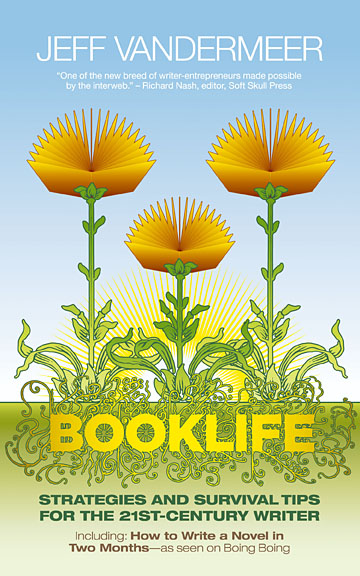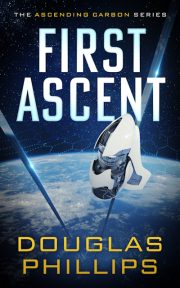Guest Post–Just Breathe: Rejuvenating Your Imagination
by Jeff VanderMeer
 Sometimes we forget to breathe when it comes to our creativity. By which I mean we are so busy creating and interacting with the world that we forget to pause, to be silent, to be alone. The imagination, the spark of all creativity, is a renewable resource, but it is not an inexhaustible resource. You can raze the forest, drink the stream dry, and not get it back…or not get it back right away.
Sometimes we forget to breathe when it comes to our creativity. By which I mean we are so busy creating and interacting with the world that we forget to pause, to be silent, to be alone. The imagination, the spark of all creativity, is a renewable resource, but it is not an inexhaustible resource. You can raze the forest, drink the stream dry, and not get it back…or not get it back right away.
As I get older, I have more and more of an appreciation for the need to be still, the need to be silent, and the need to be alone. I have less energy than I did when I was younger. My mind is less elastic, less flexible. On the other hand, because I have to be I am craftier now than I was in the twenties or thirties, and I have more experience, although not necessarily more wisdom.
Any wisdom I do have as regards tending to my own personal creativity has to do with monitoring myself and knowing my limits—allowing space for my imagination to guide me, and for it to recharge after long, difficult creative endeavors.
Two particular examples: after finishing the last novel in my Ambergris cycle, Finch, I made myself take a break from fiction. I knew that I would not just be worn out from writing an intense novel but also going out into the world to read from it and tell people about it. I also knew that I would experience a sense of loss from having lived in a world and with characters for not just three books but eighteen years of my life: almost my entire adult life. You cannot help but feel unmoored and at sea after such an immersive experience—and an experience that took so much of your imagination to see through to completion, with each book a different type of spark, a different approach to creation. So I gave myself permission not to write fiction. I forgave myself in advance…and slowly, over time, I could feel the urge to write fiction come back, and the inklings of inspiration, and those moments of going to sleep with a character or idea in my head…and waking up to find the solution, the catalyzing image, the scene expressed whole in my mind.
On a smaller, weekly scale, I also monitor my limits. Recently, my wife Ann and I undertook a fairly mammoth anthology in terms of concept and the number of what I’d call “moving parts”: The Thackery T. Lambshead Cabinet of Curiosities (HarperCollins, 2011). For this book of fictions we needed faked museum exhibits, recollections of visits with Dr. Lambshead, fiction in the form of essays, and traditional short stories—all integrated with art from over 25 artists, some of them living in countries as far away as Russia. Just keeping this straight in your head is a task, let alone seizing opportunities for communication between fictions created by sometimes wildly different writers. In addition, I knew I’d be writing the connective tissue in the form of a fictional frame and fictional introductions to each section, and that these would set not just the context but the emotional tone. Well, this stuff doesn’t just conjure itself out of blue sky and clean air. It is a cumulative process and you can’t just leap in and do it all in one go. You need space: silence, stillness, aloneness. It’s a stop-and-go-and-stop-again process. Otherwise, you wring the rags dry and what comes out is attenuated, brittle, uninteresting.
So for the past two weeks, my goal hasn’t been just to write this material—it has been to set up roadblocks to writing, to find ways to procrastinate and delay so that (1) my imagination has the time necessary to work through the creative problem set before it and examine all of the possibilities and (2) so that I don’t reach that point of attenuation where it’s almost as if you’ve cooked your chicken dinner until it’s dry and practically inedible. It looks like something moist and delicious, but it most definitely isn’t.
Being aware of your limits—weekly, monthly, yearly—and having, in an odd way, the discipline to know when not to write, when to let yourself breathe, is part of making sure you have a long and happy career in your chosen creative endeavor.
—
This post originally appeared in Booklife Now (Booklife: Strategies and Survival Tips for the 21st-Century Writer)
—
Jeff VanderMeer has had novels published in fifteen languages, won multiple awards, and made the best-of-year lists of Publishers Weekly, the San Francisco Chronicle, the LA Weekly, and many others. His award-winning short fiction has been featured on Wired.com’s GeekDad and Tor.com, as well as in many anthologies and magazines, including Conjunctions, Black Clock, and in American Fantastic Tales (Library of America). His nonfiction has appeared in the New York Times Book Review, the Washington Post, The Huffington Post, and hundreds of others. In addition, he has edited or co-edited more than a dozen influential fiction anthologies for, among others, Bantam Books and Pan Macmillan. On the pop culture front, VanderMeer’s work has been turned into short films for PlayStation Europe and videos featuring music by The Church. For more information, visit jeffvandermeer.com or contact vanderworld@hotmail.com.




